

Global Perspectives on Digital Health
Shubs Upadhyay
🌍 Global Perspectives on Digital Health
A podcast unpacking the stories, insights, and innovation shaping health systems and underserved communities.
🎧 Listen on Apple, Spotify. Watch on YouTube
A podcast unpacking the stories, insights, and innovation shaping health systems and underserved communities.
🎧 Listen on Apple, Spotify. Watch on YouTube
Episodes
Mentioned books
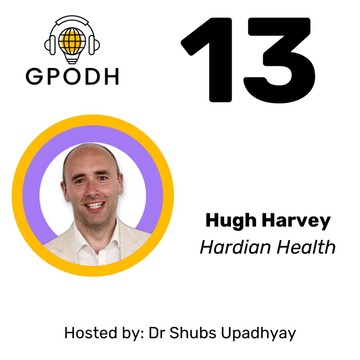
Apr 22, 2025 • 55min
Regulatory strategy for founders and policy makers
Practical breadth and depth on the global state of regulation from someone at the cutting edge of regulatory policy. Shubs welcomes Hugh Harvey, founder of Hardian Health and a regulatory expert in digital health. Shubs and Hugh discuss the complex landscape of medical device regulation worldwide, with emphasis on how these frameworks impact digital health innovation in low and middle-income countries (LMICs). Guest BackgroundHugh Harvey is a former radiologist who transitioned to the digital health industry. After working at Babylon Health and serving as Clinical Director at Kheiron Medical (where they secured Europe's first CE mark for a deep learning-based breast cancer detection device), Hugh founded Hardian Health to help companies navigate regulatory pathways for AI and digital health solutions.Key Discussion PointsThe Global State of Medical Device RegulationRegulatory Variation: Hugh explains the significant differences in regulatory approaches between regions like the EU (stricter) and the US (increasingly deregulatory)(Some) LMIC Contexts: Only about 40% of African countries have actual medical device regulations, with only South Africa having comprehensive frameworksCybersecurity Risks: Medical health data sells for more than financial data on black markets, making robust regulation essential for protecting patientsChallenges for Digital Health InnovatorsFounder Misconceptions: Many startups allocate insufficient resources for regulatory compliance. Regulatory compliance should represent 5-10% of a company's overall budget.Regulatory Debt: Postponing regulatory considerations creates compounding challenges that become increasingly difficult to address later down the lineLarge Language Models: Hugh's skepticism about LLMs in healthcare, noting they're "massively overrated" for medical reasoning tasks and face significant regulatory hurdles, and yet Hugh sees some promise over the hill. Practical Guidance for Digital Health CompaniesGetting the mindset right: Thinking about it in the same way you might approach a driving test. Universal Standards: Quality management systems (ISO 13485) are increasingly harmonized globallyApproach in LMICs: Thinking about deploying in an place where there is little to no regulatory structure? You might want to consider securing certification in countries with established regulatory pathways prior, and then work with the local government.What Regulators Could Do BetterProactivity: Regulators should be more proactive in providing guidance on novel technologiesTransparency: More open sharing of regulatory decisions would help the entire industry move forwardCapacity: Governments should increase funding for regulatory bodies to reduce backlogs and improve efficiencyChapters00:00 Introduction and Background04:22 The State of Regulation in Healthcare06:36 Why so regulated?09:24 Global Perspectives on Regulatory Approaches16:53 Harmonization of Global Standards19:34 Recommendations for Regulators31:53 Regulatory strategy for founders: The Driving Analogy42:14 What if there is little or no regulatory enforcement where I operate?43:59 The Five Stages of Regulatory Grief47:44 Hugh's spicy takes 🌶️Key Quotes"Regulations are written in blood... the reason regulations/FDA are as they are today is because of events like thalidomide."What's the cost of not being compliant? Well, it's everything, it's your entire business model.""The attack surface vector, especially under these generative AI models, is huge, vast, and frankly, completely unknown."Hugh provides a compelling case for embracing regulatory requirements as not just necessary obligations but strategic advantages. While acknowledging the challenges of navigating complex regulatory landscapes, particularly for innovators working in regions with limited frameworks, he offers practical guidance on approaching compliance as a foundation for long-term success in digital health. You can find Hugh and his work at hardianhealth.comLiked this episode? You might also like these:Episode 3: Bilal MateenEpisode 5: Prof Stephen Gilbert 💕 If you found this podcast episode helpful, please leave a comment, give us a 5 star review and share with your colleagues and people who would find this useful. It helps us reach the people who are implementing and could find this useful in creating an impact with digital health in LMICs. Check out the Substack here
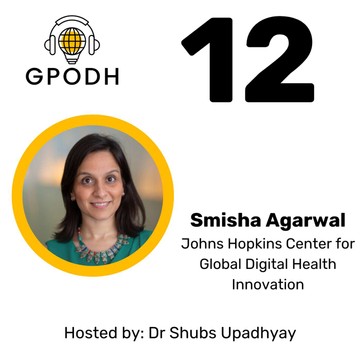
Apr 16, 2025 • 45min
Health First, Innovation Second. Smisha Agarwal on what needs to change in global digital health.
Dr. Smisha Agarwal (Johns Hopkins University Global Center for Digital Health Innovation) joins me to unpack some hard truths on the Global Perspectives on Digital Health podcast. 🛑 Why global health systems remain fragile 📉 How digital tools often scale without legitimacy 📊 What’s wrong with our fixation on "did it work?" and significance values 🔁 And how global health is stuck in systems that haven’t evolved💬 “We’re brought into a system of aid and global development that has stopped questioning how things were done. And the world has progressed, but our field hasn’t.”🔑 But Smisha also offers a way through:- Thinking differently about evaluating system level impact- The work of the Oxford Open Health Journal to increase visibility and representation of people's research in LMICs👉 If you work in digital health, research, policy, or global development this is for you.About Smisha:Dr.Smisha Agarwal, PhD, MPH, MBA, BDS is the Director of the Center for Global Digital Health Innovation and Associate Professor in the Department of International Health at the Johns Hopkins Bloomberg School of Public Health. She brings expertise in advancing primary healthcare through strengthening community health systems and leveraging innovative technological solutions including digital devices. A part of her research has focused on using predictive analytics and machine learning algorithms based on routine monitoring data to enhance our understanding of quality of care, create safety nets to care for high-risk populations and improve effectiveness of reproductive health services.Over the last two decades, her research has been leveraged by normative agencies like WHO to develop guidelines on national digitaltransformation, donors to guide investments in primary health care, and governments to develop their national digital health strategies. She is the Editor-in-Chief of the Oxford Open Digital Health Journal.
(00:00) - Introduction, Smisha's background
(05:01) - Impact of Global Health Aid Cuts
(10:03) - Challenges in Monitoring and Evaluation
(15:35) - Health First: How to think about outcomes, measuring the right things
(20:54) - Supporting healthcare workers as a goal
(26:37) - Impact: Measuring what matters
(28:39) - Donor decision making dynamics
(30:09) - Rethinking system level success: from yes/no to more nuance
(33:50) - Innovations in Academic Publishing
(37:37) - Challenging the Status Quo in Global Health
(42:20) - Upcoming events in Global Digital Health
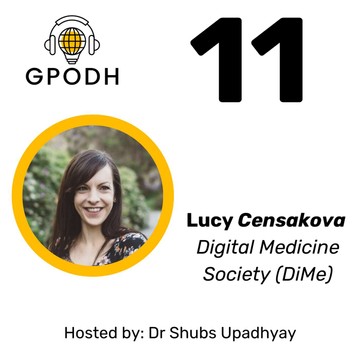
Mar 28, 2025 • 20min
Digital mental health research insights
Bringing research to implementation. Shubs is joined by Lucy Cesnakova from DiMe in this quick dive into an important piece of research bringing insights to advance digital solutions that serve mental health, DiMe's work here was great here because Lucy and the team intentionally sought out input from different countries, access levels and other demographics across the ecosystem. It's great that the Wellcome Trust funded this work. And more of this type of research would clearly be, ahem, welcome. Why should I listen? This will be useful if you are building solutions with underserved communities in mental health and applies both to high income and LMIC settings. If you are researching digital endpoints and biomarkers in mental health or involved in health system transformation for mental health this is well worth a listen. We cover the big commonalities across all geographies, plus what we can learn about local nuances as well as some key a-ha moments Lucy and the team gained. Check out my substack article for a written reflection on this episode. Chapters00:00 Introduction to DiMe and Lucy's work03:57 Current healthcare context06:01 Methodology of Research and Data Collection08:27 Key Findings: Universal Commonalities in Mental Health Technologies16:04 Unique local insightsHere's the full report: https://datacc.dimesociety.org/mental-health/DiMe society:https://dimesociety.org/About Lucy:Lucy Cesnakova, MS, is a Program Lead at Digital Medicine Society (DiME).At DiME Lucy has led several projects in the space of digital measurements and technologies for health: a flagship pre-competitive collaboration project to advance the digital measurement of nocturnal scratch; an initiative that explores path forward for sensor-based digital health technologies for mental health; or recent work on use of patient-generated health data in development of medical products and health technologies. At DiMe she works with industry, patient organizations, regulators, clinicians and payers to create resources that will improve adoption of digital technologies in research and care. In the past, Lucy has led technical development of digital endpoints or other software solutions as a product lead.
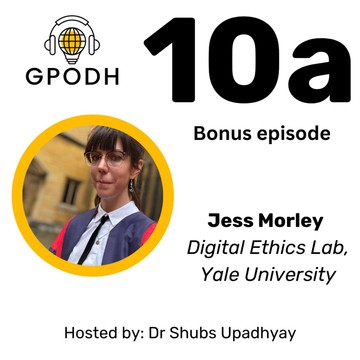
Feb 10, 2025 • 17min
Ethics for digital health companies
Special bonus episode. This is a shortened version of the episode with Jess Morley, focusing on ethical approaches and takeaways relevant for digital health companies. How do you move from having ethical approaches as 'nice to haves' to actually getting prioritised. It can be tough when good intentions rub up against business realities. Jess shows how you can avoid getting your initiative or feature getting kicked down the roadmap. People who will find this useful:Product managers and product leadersDesign/UX folkSoftware engineersClinical safety officersClinicians working at digital health companiesQuality assurance and regulatory professionalsFoundersOperations leads
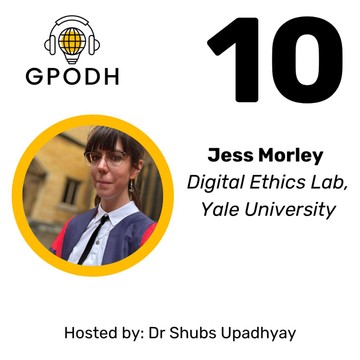
17 snips
Jan 20, 2025 • 58min
Making ethics actionable in digital health
Jess Morley, a postdoctoral research associate at Yale's Digital Ethics Center, shares her expertise on integrating ethics into digital health. She discusses the ethical dilemmas faced by health tech leaders and the challenges of reconciling good intentions with business pressures. Morley critiques the UK's AI action plan and emphasizes the importance of inclusive data practices. She advocates for embedding ethics in procurement processes and product development, urging stakeholders to prioritize social responsibility amid a growing focus on economic growth.
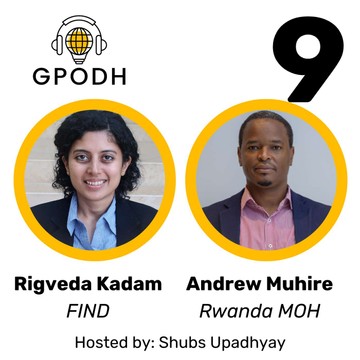
Dec 19, 2024 • 56min
Policy insights from the Rwanda Ministry of Health and FIND
🎙️ New Episode: Connecting Global & Local Perspectives in Digital Health ImplementationIn this special episode, we close out the year with two fantastic guests: Rigveda Kadam, Digital and AI Lead at FIND, and Andrew Muhire, Chief Digital Officer at Rwanda's Ministry of Health.Building on the innovator insights in Rwanda from our previous episode with Dr. Jana Alagarajah, this discussion dives into the critical connection between product development partners and ministries of health to create conditions for successful digital health implementation.From Rwanda’s patient-centered approach to FIND’s global perspective across LMICs, we explore:✔️ How Rwanda balances top-down mandates with frontline adoption to foster trust.✔️ Tackling antimicrobial resistance with clinician decision support as a case study.✔️ Using systems thinking to measure success in evolving interventions—Andrew’s "contribution lines" approach is a must-hear!✔️ Rigveda’s wishlist for the ecosystem: from WHO priority areas to better alignment on patient journeys.Tune in for an inspiring conversation on infrastructure, policy, and trust—key elements for making impactful digital health innovations stick.FIND: https://www.finddx.org/ Some resources mentioned: Rwanda MoH 7 priorities: https://newmoh.staging.risa.rw/1/strategic-plans-prioritiesThe value of diagnostic imaging for enhancing primary care in low- and middle-income countries: https://www.thelancet.com/journals/eclinm/article/PIIS2589-5370(24)00478-4/fulltextASSESSMENT OF DIAGNOSTIC GAPS AND RELEVANT DIGITAL HEALTH SOLUTIONS SUMMARY FINDINGS FROM PERU, INDIA, NIGERIA AND UGANDA: https://www.finddx.org/wp-content/uploads/2022/12/20201515_rep_assessment_dx_digital_health_FV_EN.pdfPrinciples for Digital Development: https://digitalprinciples.org/Overview of the validation platform: AI validation platformAbout the guests: Riveda Kadam: Experienced global health strategist with expertise in digital health, AI, and public health programs, driving impactful innovations and policy alignment.Andrew Muhire : Chief Digital Officer at the Rwanda Ministry of Health
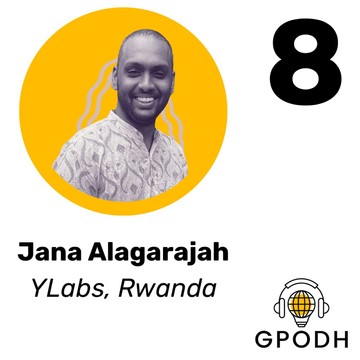
Dec 2, 2024 • 59min
Co-designing mental health solutions with young people in Rwanda
Implementing a digital mental health solution in Rwanda. What does real, meaningful co-design look like?What does it mean to truly engage with a community to develop a solution they actually use and that addresses their problems? What incentives and mindsets allow us to, instead of 'driving' a certain technology into a context, stop and listen, and go in with no pre-conceived notion of what would be built?How do we get procurement and policy to really value and elevate equitable solutions?These are some of the great questions we covered in the latest podcast episode with Dr Jana Alagarajah. His wide experience, and work implementing a digital mental health tool with young people in Rwanda gives us some great talking points. Jana shares what he learned working with people and community leaders, as well as carers, and how they approached co-design and evaluation. We also talked about his insights from working in partnership with UNICEF, USAID, the King's Fund and Health Foundation. Dr Jana Alagarajah (MD MPH): Digital mental health specialist, UK-trained public health doctor, and psychiatrist co-designing equitable and impactful digital health innovation in Africa with young people as Technical Lead at YLabs. Partnering with UNICEF, USAID, and Gates Foundation, he leverages digital tools to strengthen health systems.Linkedin: https://www.linkedin.com/in/janaganalagarajah/YLabs: https://www.ylabsglobal.org/Grand Challenges Canada: https://www.grandchallenges.ca/Key Resources: Design:Co-design: YLabs’ Youth-driven approach to digital health focussing on co-designing with youth. Designing for diversity: Importance of co-creating culturally adapted tech to address health inequalities in diverse populations - report from NHS Race and Health Observatory. Regulation: Co-developed Africa’s first evidence-based digital mental health regulation (‘HealthTech Hub Africa Digital Health Policy Blueprint 1.0’) with the Rwandan Ministry of Heath, Africa CDC, Jhpiego, Novartis Foundation covering key design elements such as interoperability, data privacy and UX approaches to meet the needs of diverse populations. Implementation:Digital stigma reduction tool: ‘Prepare for a Better Tomorrow’ (Rwanda, 2021): Rwanda’s first youth-driven, holistic digital learning and peer support platform to increase mental health literacy and psychosocial support for Rwandan youth aged 10-19 years old. Funded by Grand Challenges Canada. Digital tools for mental healthcare workers: ‘USAID Kijana Nahodha’ (Tanzania, 2023): digital mental health education and referral tool for community health workers in Tanzania as part of a $5.4M USAID grant, impacting 140,000 youth and 250 community health workers. Evaluation: Evidence generation: A systematic literature review evaluating the efficacy of digital mental health technologies for youth in low and middle-income countries: Alagarajah J, Ceccolini D, Butler S. Digital mental health interventions for treating mental disorders in young people based in low-and middle-income countries: A systematic review of the literature. Cambridge Prisms: Global Mental Health. 2024;11:e74. doi:10.1017/gmh.2024.71Innovative approaches to digital evaluation: At YLabs, we have utilized traditional evaluation methodologies such as cluster RCTs to evaluate our digital interventions. However, given the challenges in evaluating digital health solutions, novel methodologies, such as cyclical evaluation, can be used to maximize usability, and support integration into health systems.

Nov 13, 2024 • 1h 6min
Supporting rural healthcare in India with technology
OverviewWe are joined in this episode by Ruchit Nagar, the CEO and Co-Founder of Khushi Baby. For his efforts to deliver scalable public health impact, Ruchit has been recognized as a Forbes 30 under 30 leader in Health Care, a World Innovation Summit in Health Young Innovator, and a Distinguished Young Alumnus by by the Yale School of Public HealthThis episode covers into the role of India's Community health workers, or Accredited Social Health Activists (ASHAs). We hear from Ruchit's experience implementing with Khushi baby the challenges of integrating technology to support health workers. Ruchit also gives us a lowdown on India's digital public health approach and shares his key learnings and insights for people looking to implement tech in rural areas. We get into the challenges in policy, the data infrastructure layer and the importance of funding for sustainable health initiatives. Ruchit also emphasizes the need for better support and resources for ASHAs, the impact of technology on healthcare delivery, and the necessity of aligning incentives to improve health outcomes.Chapters00:00 Intro03:53 Khushi baby origins05:10 Challenges in Community Health Delivery07:18 The Role of ASHAs in Healthcare12:28 The Need for Integrated Solutions14:14 India public health digital ecosystem 10119:51 When "too much digital" gets in the way of good care22:28 Pitfalls in funding and investment approaches23:20 The 3 I's that drive implementation success31:56 Leveraging Data for Health System Strengthening35:53 Challenges in Health System Integration41:35 Measuring Impact and Effectiveness47:44 Aligning Incentives with Ground Realities53:56 Navigating Quality, Evaluation and Regulatory Challenges56:48 Future Directions for Khushi Baby01:02:02 Ruchit's top takeaway for developersReferencesKhushi baby websiteBook reference: Poor Economics by Abhijit V. Banerjee and Esther DufloTB free India 2025Like what you hear? Follow us. I'd love your feedback on what you found valuable, and what you want to see. Comment on youtube, and follow the page on linkedin. Want to share your story? Get in touch.
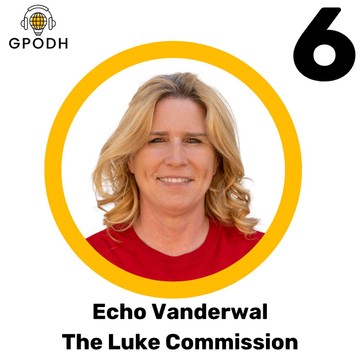
Aug 2, 2024 • 59min
Impactful digital health transformation through a clear vision and values: insights from Eswatini
Echo Vanderwal, Executive Director of The Luke Commission, leads transformative healthcare for underserved communities in Eswatini. She discusses innovative telehealth hubs using shipping containers for better access to care. Drones are employed to deliver vital medications like antivenom quickly and efficiently. Vanderwal emphasizes the importance of community involvement and building compassion in healthcare staff. She also shares insights on developing local capacity for drone operations and navigating funding challenges in digital health initiatives.

Jul 4, 2024 • 1h 11min
What is the right approach for regulation and evaluation of digital health technologies?
Episode 5: What is the right approach for regulation and evaluation of digital health technologies?In this conversation, Shubs Upadhyay interviews Stephen Gilbert, a professor of medical device regulatory science, about the challenges and successes of digital health regulation and implementation. They discuss the need for flexibility in regulation, the importance of feedback from clinicians and patients, and the evaluation of digital health technologies. They also explore the concept of suites or groupings of digital devices and the need for regulatory approaches that acknowledge their flexibility. Gilbert emphasizes the need for regulation to adapt to the changing landscape of digital health and to ensure that it is fit for purpose. Stephen also talks about what health system leaders, policy makers and developers can learn from the challenges of the DiGA fast track reimbursement framework in Germany, the PECAN framework in France and what is coming in the UK. As well as calling out the stark differences in approach from the FDA and the EU, Stephen helps understand the deeper reasons for the different approaches.On evaluation of effectivenss, Stephen emphasizes the importance of integrating different technologies into a cohesive system rather than treating them as isolated tools. The discussion also highlights the role of regulation in facilitating interoperability and promoting the use of digital technologies in healthcare. A great section on the need for long-term thinking on exactly how we want to transform healthcare delivery, setting clear goals, and continuous feedback loops is emphasized, along with the recognition that digital transformation in healthcare requires investment, embedding and time to get back the ROI. TakeawaysFlexibility is crucial in digital health regulation to adapt to the rapidly changing landscape of technology and healthcare.Feedback from clinicians and patients should be actively encouraged and integrated into the regulatory process.The evaluation of digital health technologies should consider their unique characteristics and the need for holistic assessment.Regulatory approaches should acknowledge the flexibility and groupings of digital devices, such as suites, to ensure they are fit for purpose.Digital healthcare involves the integration of various technologies, such as teleconsultation and remote monitoring, into a cohesive system.Regulation plays a crucial role in promoting interoperability and facilitating the use of digital technologies in healthcare.Long-term thinking and clear goals are necessary for effective digital transformation in healthcare.Continuous feedback loops and monitoring are essential for evaluating the effectiveness of digital health tools.Investment is required for digital transformation in healthcare, and initial costs may be higher before yielding dividends.Links to papers mentioned:Paper on regulation, reimbursement approach: flexible groupingsPaper on regulation, reimbursement approach: flexible suites of technologiesA/B testing framework mentioned hereStephen Gilbert, Professor at the Faculty of Medicine, Dresden University of Technology (Else Kröner Fresenius Center for Digital Health), leads a multidisciplinary team specializing in regulatory science for medical devices and in vitro diagnostic devices. With over 15 years of expertise in clinical research, computational biology, and regulatory science, he is committed to advancing digital health innovation and governance.


